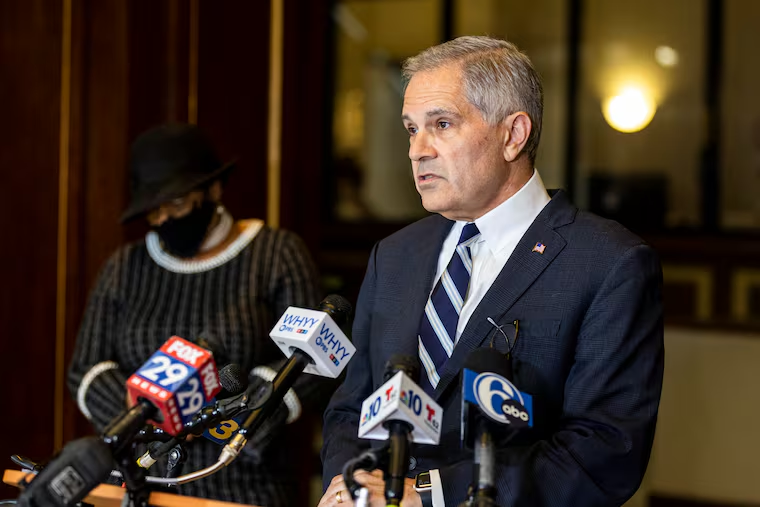Pa. Senate sets rules for Philly DA Larry Krasner’s impeachment trial
Discussion was focused on what Republicans called the chamber’s constitutional obligation to consider impeachment, with one GOP member saying: “This is an undertaking that the Senate did not ask for."

HARRISBURG — The Pennsylvania Senate on Tuesday approved two procedural measures needed to stage an impeachment trial for Philadelphia District Attorney Larry Krasner, the latest step in an unprecedented effort to remove the city’s prosecutor from office.
The resolutions set the rules of the trial, which is expected to begin in January, and said the Senate will formally accept the impeachment articles on Wednesday.
The rules passed the Republican-controlled chamber, 30-20, largely along party lines, despite objections by Democrats, who cast the impeachment drive as procedurally unconstitutional because the trial isn’t scheduled to begin until after a new legislature is set to be sworn in.
The Senate’s moves came hours after a House committee investigating Krasner’s office released a report recommending a series of legislative moves to rein in the district attorney’s authority, including a constitutional amendment to allow for recall elections in Philadelphia. The recommendations are not binding and would face significant legislative challenges, as Democrats last month won a narrow majority of seats in the state House.
In contrast to the heated and politically charged debate that unfolded in the House earlier this month, discussion in the Senate on Tuesday was largely focused on process and what Republicans called the chamber’s constitutional obligation to consider the articles of impeachment sent to them by the lower chamber.
“This is an undertaking that the Senate did not ask for, did not instigate, and did not collaborate in,” State Sen. Lisa Baker (R., Luzerne) said. “The choices about charging and timing are purely the providence of the House.”
The Pennsylvania House impeached Krasner, a Democrat, on Nov. 16, accusing him of mismanaging his office, implementing policies that catalyzed the city’s shootings crisis, and obstructing a legislative committee investigating him — allegations Krasner has strenuously denied. The impeachment resolution passed largely along party lines.
With the legislative session scheduled to end Wednesday, Senate leadership summoned members of the upper chamber back to Harrisburg this week to consider a handful of procedural measures.
Democrats on Tuesday argued the rules are fundamentally flawed because they would require a trial take place after the legislative session ends. Democratic Leader Jay Costa, of Allegheny County said that timeline violates state law, which requires legislation to pass both chambers of the General Assembly within the same legislative session.
“Many of us on this side of the aisle refuse to vote for a resolution that legitimizes the continuation of an unconstitutional process into the next session,” he said.
Krasner has already filed a lawsuit in Commonwealth Court, arguing, among other things, that the House has no authority to impeach him. That challenge is pending, and Krasner has said other legal challenges are being considered.
There’s little relevant precedent for courts to consider. The legislature has never attempted to remove a district attorney who has not been accused of a crime, and only a handful of officials have been impeached in the history of the state.
The most recent impeachment trial was in 1994, when the Senate unanimously voted to remove state Supreme Court Justice Rolf Larsen from office for making decisions from the bench based on conversations with a political supporter. Larsen had already been criminally convicted of a drug-related conspiracy.
» READ MORE: Philly DA Larry Krasner has been impeached. Here’s what you should know.
Senate Republicans said the rules passed Tuesday were based on the Larsen trial. Under the guidelines, the case will be presented by impeachment managers — two House Republicans and one Democrat — and their attorneys. Krasner and his lawyers also will be permitted to present a case by offering arguments and questioning witnesses.
Conviction and removal from office requires a two-thirds vote on any of the seven articles of impeachment approved against Krasner. The GOP will likely hold 28 of 50 seats next year — five votes shy of the threshold if every member is present.
The impeachment managers are expected to formally deliver the articles to the Senate on Wednesday, at which point senators will take an oath to abide by the state constitution. Senators are also expected to vote Wednesday on legislation that summons Krasner to appear at his trial.
The articles of impeachment relied in part on documents subpoenaed by the House Select Committee on Restoring Law and Order, which summarized its five months of work in a report issued Tuesday.
The report did not recommend impeachment. But Rep. John Lawrence, the Chester County Republican who chaired the committee and voted to impeach Krasner earlier this month, wrote in it: ”After reviewing the facts, I conclude that this untenable situation will continue to exist as long as Mr. Krasner remains in office.”
In addition to suggesting amending the state constitution, the committee proposed stripping the DA’s oversight of certain gun possession charges and granting the state attorney general discretion to prosecute them. They also recommended funding hazard pay for Philadelphia police officers.
Other recommendations are actions city leaders, including Krasner, have long called for: funding new technology to solve crimes, and including the city in the state’s construction of a new forensic crime lab.